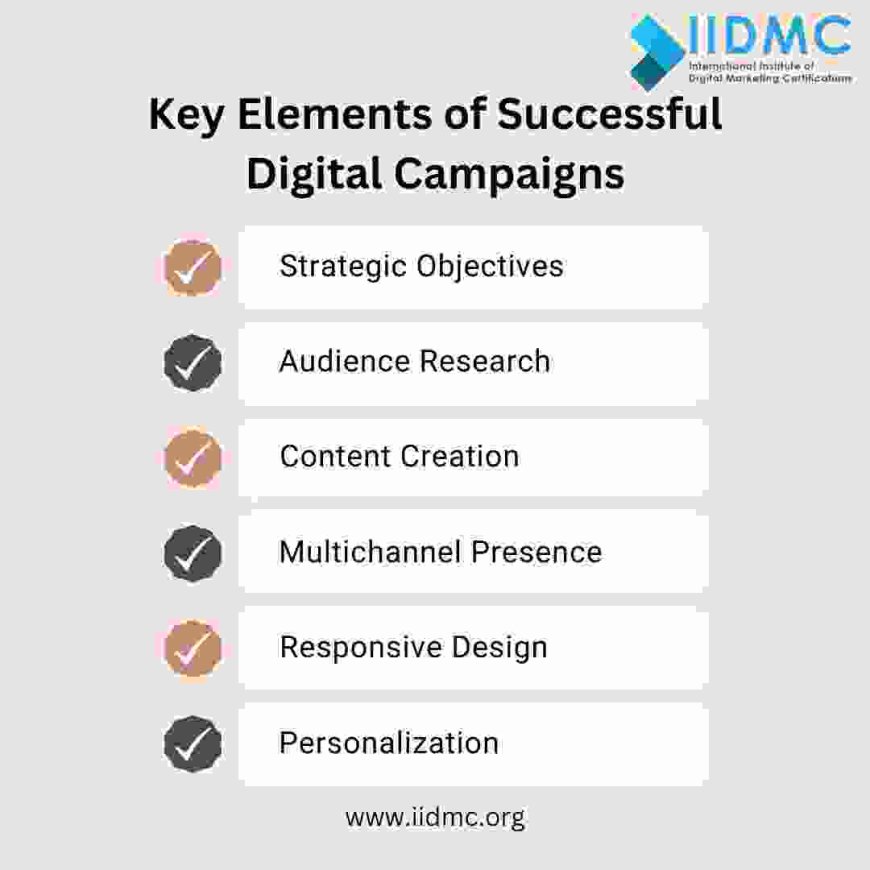Key Elements of Successful Digital Campaigns
Discover the basics of successful digital campaigns. reaching your audience, using SEO, and analyzing data for effective online marketing results.

Digital campaigns refer to strategic marketing efforts conducted through digital channels and platforms to achieve specific business goals. These campaigns leverage various online mediums such as social media, email, search engines, websites, and other digital channels to promote products, services, or brands. The primary aim is to reach and engage the target audience, drive brand awareness, generate leads, and ultimately, convert prospects into customers.
Digital campaigns encompass a wide range of activities, including social media marketing, search engine optimization (SEO), content marketing, email marketing, online advertising, and more. The key is to use data-driven insights to tailor the approach, ensuring that the campaign resonates with the intended audience and achieves measurable results. Successful digital campaign often involve a mix of creativity, analytics, and adaptability to navigate the dynamic environment of the online world.
Impact of digital campaigns on business growth
-
Enhanced Brand Visibility: Digital campaigns boost brand recognition by establishing a consistent online presence across various platforms.
-
Audience Engagement: Engaging content fosters a sense of community, encouraging interactions, comments, and shares that build loyalty and trust.
-
Effective Lead Generation: Utilizing channels like email marketing and online advertising, digital ads campaigns efficiently generate and nurture leads through the sales funnel.
-
Improved Conversion Rates: Targeted and personalized campaigns increase the likelihood of converting prospects into customers by delivering the right message at the right time.
-
Data-Driven Decision Making: Analytics from digital campaigns provide valuable insights, enabling businesses to make informed decisions for continuous improvement.
-
Global Reach and Cost-Effectiveness: Breaking geographical barriers, digital campaigns offer a cost-effective way to reach a global audience, allowing businesses to allocate budgets efficiently and adjust strategies based on real-time performance.
Challenges in running Digital Campaigns
Running digital campaigns comes with a set of challenges. Here are six common hurdles businesses may face
-
Adapting to Algorithm Changes: Digital platforms frequently update their algorithms, impacting how content is displayed. Staying abreast of these changes and adjusting strategies to maintain visibility can be challenging.
-
Saturation and Competition: With the increasing popularity of digital marketing, competition for audience attention is fierce. Breaking through the noise and standing out in a saturated market can be a significant challenge.
-
Data Privacy Concerns: Heightened awareness of data privacy has led to stricter regulations. Navigating these regulations, such as GDPR or CCPA, while still effectively targeting and personalizing campaigns requires careful consideration.
-
Platform Diversity: Different platforms have varied user demographics and content formats. Managing campaigns across diverse platforms necessitates a deep understanding of each, making it challenging to create a cohesive and effective strategy.
-
Tech Integration and Complexity: Integrating various digital tools and technologies can be complex. Ensuring seamless connectivity between platforms and utilizing the full potential of available technologies poses a challenge for many businesses.
-
Measuring ROI and Attribution: Determining the return on investment (ROI) for digital campaigning and accurately attributing conversions to specific channels or touchpoints can be challenging. The multi-channel nature of digital marketing complicates the assessment of campaign effectiveness.
What Are the Key Elements of Successful Digital Campaigns?
To overcome challenges and optimize digital marketing strategies, businesses should prioritize staying informed about industry trends, algorithm changes, and data privacy regulations. Adopting an audience-centric approach, understanding target audience preferences, and diversifying content across various platforms enhance engagement. Leveraging data-driven decision-making and implementing strategic tech integration streamline processes and improve efficiency. Employing advanced attribution models helps accurately measure campaign effectiveness and understand the customer journey. Overall, businesses need to remain adaptable, leveraging insights from analytics and continuously refining their digital marketing strategies to ensure they align with evolving market dynamics and effectively contribute to sustained business growth.
key elements necessary for successful digital campaigns

Strategic Objectives and Planning:
Begin by establishing clear and achievable objectives for your digital campaign. Whether it's increasing brand awareness, driving website traffic, or boosting sales, having well-defined goals will guide the overall strategy. Develop a comprehensive plan that outlines the target audience, the key message you want to convey, and the digital channels you'll utilize to reach your audience effectively.
Audience Research and Personalization:
Dive deep into audience research to gain a thorough understanding of your target demographic. Identify their preferences, behaviours, and pain points. This knowledge allows you to tailor your content and messaging to resonate with your audience on a personal level, increasing the likelihood of engagement and conversion.
Compelling Content Creation:
Craft compelling and relevant content that aligns with your campaign objectives and resonates with your audience. Utilize a mix of content formats, such as blog posts, social media updates, infographics, and videos, to cater to different preferences. Quality content not only captures attention but also establishes your brand as a valuable source of information.
Multichannel Presence:
Embrace a multichannel approach to ensure your brand has a cohesive presence across various digital platforms. Leverage social media, email marketing, search engine optimization (SEO), and online advertising to maximize your reach. Consistency in messaging and branding across channels reinforces your brand identity and fosters audience recognition.
Data Analytics and Optimization:
Implement robust analytics tools to track key performance indicators (KPIs) relevant to your campaign objectives. Regularly analyze the collected data to gain insights into audience behaviour, campaign effectiveness, and areas for improvement. Use this information to make informed decisions and optimize your digital strategy for better results.
Responsive Design and User Experience:
Ensure that your digital assets, such as websites and landing pages, are designed to provide a seamless and user-friendly experience across various devices. A responsive design not only improves user satisfaction but also positively influences search engine rankings, contributing to the overall success of your campaign.
Tech Integration and Advertising Strategy:
Integrate marketing technologies to streamline processes and enhance efficiency. Automation tools can assist in tasks like email marketing and data analysis. Additionally, implement a strategic advertising strategy on platforms like Google Ads and Facebook Ads, tailoring your approach to reach specific audience segments effectively. This ensures that your advertising efforts align with your overall campaign objectives and contribute to the desired outcomes.
Successful digital campaigns require a strategic foundation encompassing clear objectives, comprehensive audience research, and compelling content creation. A multichannel approach ensures a cohesive brand presence, while robust data analytics guides optimization for better results. Responsive design and seamless user experiences across devices contribute to overall campaign success. Addressing challenges, such as algorithm changes and data privacy concerns, demands an informed and adaptable approach. By integrating technology efficiently and implementing a targeted advertising strategy, businesses can navigate the complexities of digital marketing, measure ROI accurately, and contribute to sustained growth.



























